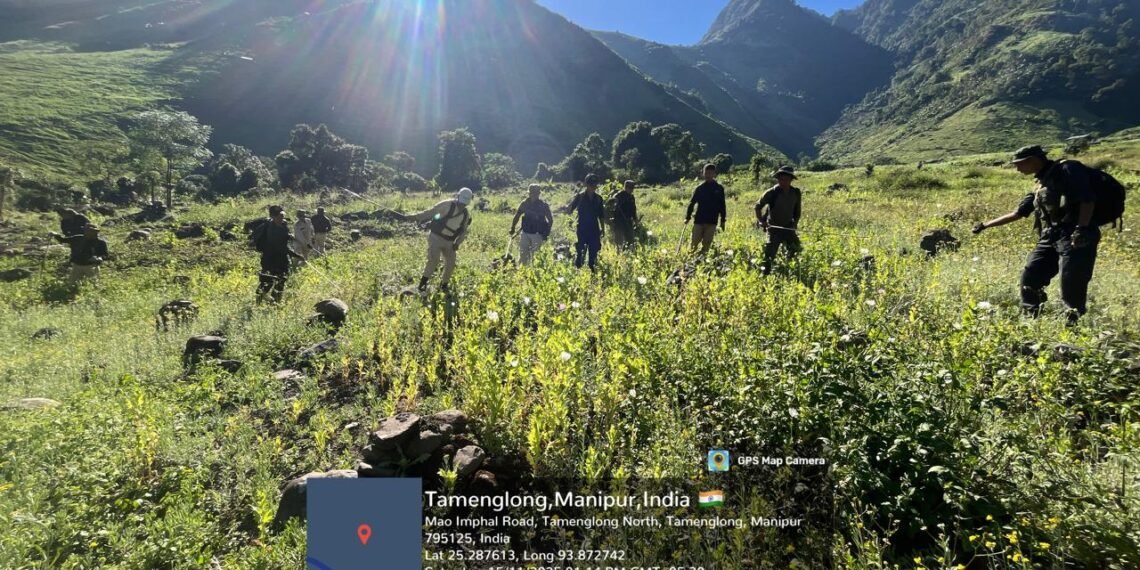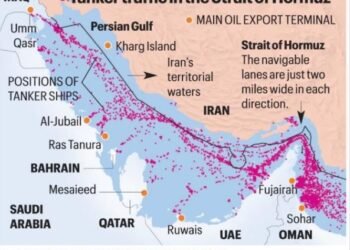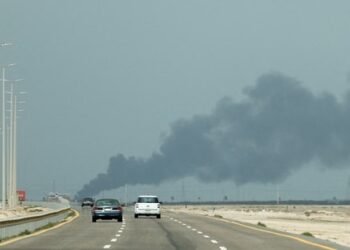Just days after security forces razed 436 acres of poppy fields in Ukhrul, ZUF militants stormed Waphong village in Kangpokpi, burning huts and accusing displaced Kuki-Zo villagers of illegal cultivation.
BY PC Bureau
November 17, 2025 : The contradiction could not be more striking.
On the same day the Zeliangrong United Front (ZUF) issued threats against “illegal immigrant intruders” — a thinly veiled reference to displaced Kuki-Zo villagers — accusing them of cultivating poppy in Kangpokpi district, security forces were torching 436 acres of flourishing poppy plantations in Somdal, the birthplace and ancestral village of Thuingaleng Muivah, the powerful general secretary of the NSCN-IM, the most influential Naga militant organisation in the Northeast.
Between 11 and 15 November 2025, joint teams of Assam Rifles, Manipur Police, CRPF and the Forest Department destroyed poppy fields across three Tangkhul-dominated locations in Ukhrul district:
• Somdal hill ranges (Muivah’s village)
• Lamlai Chingfei
• Litan
Fifty-one makeshift huts used by cultivators were burned. Officials estimate the destroyed fields would have produced several tonnes of raw opium worth hundreds of crores in the international market.
Yet, just two days later, on 17 November, ZUF cadres swooped down on tiny Waphong village in Kuki-Zo dominated Kangpokpi district, burning poppy huts and declaring:
“ZUF intensifies action against illegal encroachment on ancestral land… Violations of these warnings will not be tolerated.”
The Zeliangrong Nagas—comprising the Zeme, Liangmai, and Rongmei tribes—occupy a unique position within the broader Naga ethnic world. Spread across Manipur, Nagaland and Assam, they share a deep cultural and linguistic heritage rooted in common ancestry, oral tradition, and customary practices. Their identity as “Zeliangrong” is itself a political and cultural consolidation, emphasising unity among closely related sub-tribes within the Naga family. Historically, they have been among the most organised groups, with strong cultural institutions and political movements, including militant outfits such as the Zeliangrong United Front (ZUF), which position themselves as protectors of Zeliangrong historical rights.
Extensive poppy destruction drive was conducted from 11.11.2025 to 15.11.2025 across Ukhrul district at the hill ranges of Somdal, Lamlai Chingfei village and Litan by Security Forces in collaboration with other government agencies. An approximate area of 436 acres of poppy… pic.twitter.com/kIxrcDyLAl
— Manipur Police (@manipur_police) November 15, 2025
READ: Manipur: Tribal Women Storm Assam Rifles Camp over Youth’s Death
A Hypocrisy Exposed
Local journalists and researchers quickly highlighted the glaring double standard:
- Ukhrul district — 99% Tangkhul Naga and Muivah’s home turf — has for years been one of Manipur’s largest poppy-producing zones, yet Naga civil society bodies or Zeliangrong Nagas never issue warnings or conduct vigilante destruction there. Meitie Civil Society Organisation , and soemone like former Chief minsiter Biren singh, who 24×7 talks against poppy cultivation and narco terrorism never says a word against the spread of the menace in Naga hills.
• Somdal itself has been a well-known poppy hub for over a decade. Muivah stayed in the village for a full week as recently as October 2025, but neither NSCN-IM nor any Tangkhul organisation acknowledged the illegal cultivation happening literally in the shadow of their most revered leader. Of course, Zeliangrong Nagas and tyhe likes of Biren Singh have never uttered a word against it.
• In contrast, every poppy patch in Kuki-Zo areas is instantly labelled “Kuki narco-terrorism” or “Burmese intrusion”, with armed Naga groups rushing to burn huts and issue deadlines.
Online Backlash
Social media was scathing: “436 acres destroyed in Muivah’s backyard, and not a single Tangkhul CSO opens its mouth. But 5 acres in Kangpokpi and suddenly everyone becomes anti-drug crusader,” wrote an user.
A Kuki-Zo activist added: “If ZUF and other Naga groups are serious about drugs, let them first clean up Ukhrul, Phungyar, Kamjong and Somdal. Burning a few huts in Kuki areas for headlines while ignoring industrial-scale cultivation in Tangkhul regions is ethnic targeting disguised as anti-drug action.”
As Manipur’s “War on Drugs” intensifies — with more than 19,000 acres of poppy plantations destroyed statewide since 2017 — the past week has exposed a deeper and more troubling truth:
In Manipur’s hills, poppy has become a political weapon, wielded selectively in an ethnic conflict where each side claims moral superiority while shielding its own narco-economies.













